#Breteuil
Explore tagged Tumblr posts
Text

Château de Breteuil, Yveline region of France
French vintage postcard
#postal#france#château de breteuil#historic#french#ansichtskarte#sepia#vintage#tarjeta#briefkaart#photo#chteau#breteuil#yveline#postkaart#ephemera#postcard#postkarte#photography#region#carte postale
4 notes
·
View notes
Photo

LÉGENDE | Fantômes et revenants du château d’Hardivillers (Oise) : histoire d’une mystification ➽ http://bit.ly/Fantomes-Chateau-Hardivillers Du temps de la jeunesse de Louis XV, et chaque année vers la Toussaint, se manifestait à Hardivillers, terre de Picardie aux environs de Breteuil (Oise), un esprit que l’on disait être à l’origine d’un bruit effroyable, de hurlements épouvantables, le tout agrémenté de flammes qui faisaient paraître le château en feu...
#fantômes#revenants#château#Hardivillers#Oise#Picardie#Toussaint#Breteuil#hurlements#flamme#légende#mythe
3 notes
·
View notes
Text

Breteuil, France, 2021.
#photography#black and white#black and white photography#nikonz6#nikonphotography#nikonfrance#nikkor z 24 70/f4s#breteuil#france
5 notes
·
View notes
Text

Secrets d'Histoire consacré à “Marie-Antoinette, un Collier à Perdre la Tête !” documentaire présenté par Stéphane Bern, décembre 2024.
#films#RevolutionFrançaise#XVIIIe siècle#inspirations bijoux#MarieAntoinette#LouisXVI#Rohan#LaMotte#Valois#Cagliostro#Boehmer#Bassange#RetauxDeVillette#Breteuil#Bern
1 note
·
View note
Text

Hippolyte Bayard's birthplace at 4 Bayard place in Breteuil, France
0 notes
Text

Wax statue of Marcel Proust suffering from insomnia at the Chateau de Breteuil.
0 notes
Photo
100 years ago:


Breteuil
#breteuil#normandie#normandy#france#europe#patrimoin#patrimoine#architecture#heritage#gothic#town hall#carte postale#postcard#vintage#old
8 notes
·
View notes
Photo
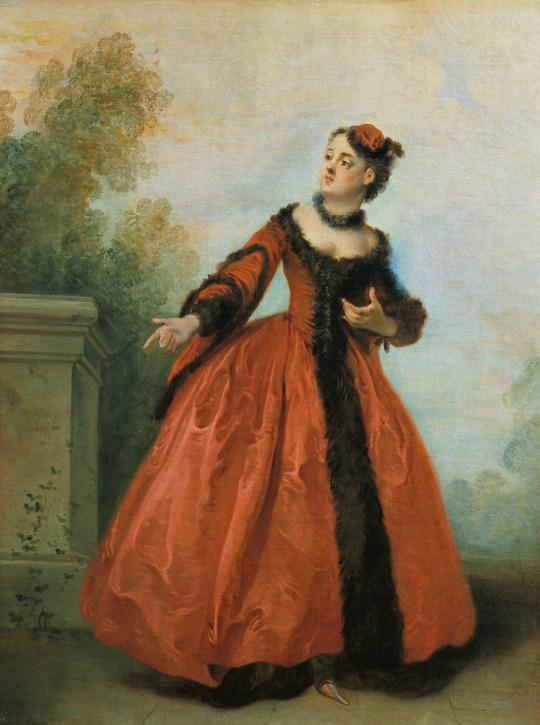

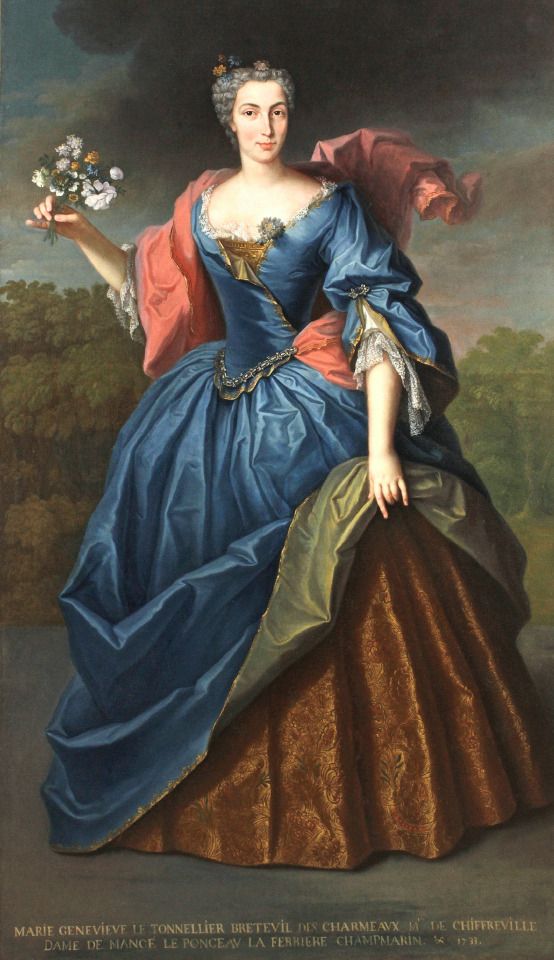
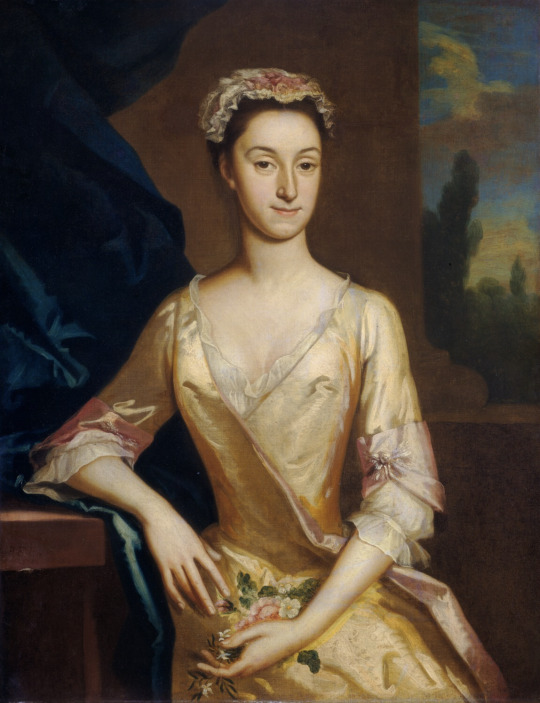
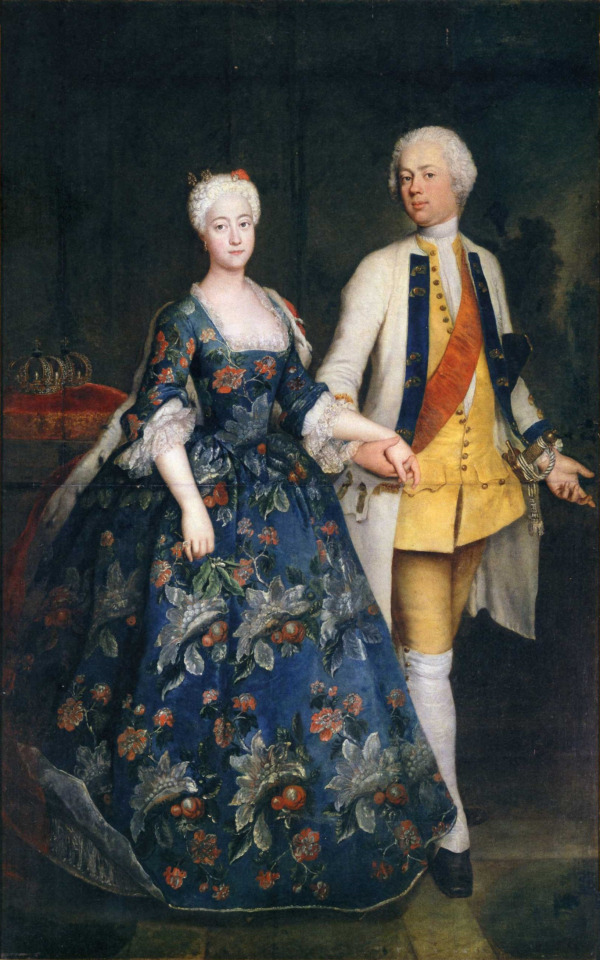
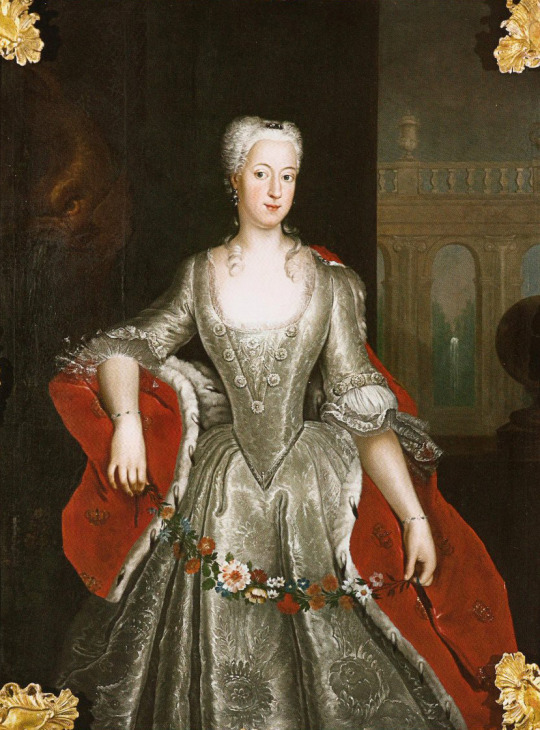
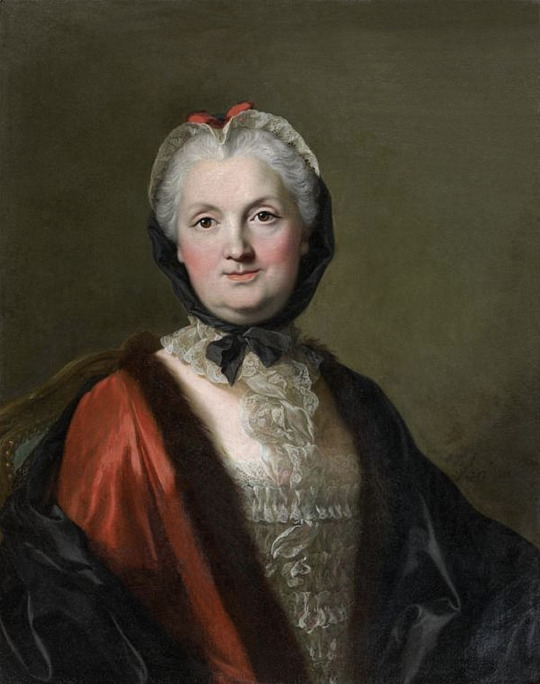
Early 1730s dresses and portraits (from top to bottom) -
ca. 1732 The Beautiful Greek (La Belle Grecque) by Nicolas Lancret (Wallace Collection - London, UK). From their Web site 1429X1960, The complex sleeves open at the top like they would in Russian court dresses a century later.
ca. 1732 Watson-Wentworth and Finch Families by Charles Philips (Yale Center for British Art, Yale University - New Haven, Connecticut, USA) persons. From Wikimedia 4902X3094. The décolletage-filling fichu would become prominent in the Louis XVI era, but just about every grown up woman wears one along with a fastened bodice, round skirt, and apron. The heads of every female are covered by a cap, veil, or hat.
1733 Marie-Geneviève le Tonnellier de Breteuil by French school (attributed to Alexis Simon Belle) (auctioned by Sala de Ventas).From invaluable.com/auction-lot/18th-century-french-school-alexis-simon-belle-a-646-c-2074af1b03 1940X3362.Round skirts flourish on both shores of the channel.
ca. 1730-1735 Lady by Joseph Highmore (National Gallery of Art - Washington, DC, USA). From their Web site 1148X1495. The cuffed outer sleeves are stuffed by under-sleeves and the dress lining has a very subdued pink contrasting with the gold color of the other layer.
1734 Princess Sophie Dorothea with Friedrich Wilhelm by Antoine Pesne (location ?). From Wikimedia1633X2611. Textiles with large patterns characterize the early 1700s. Her dress has a square neckline.suggesting French influence.
ca. 1734 Wilhelmine of Prussia, Margravine of Brandenburg-Bayreuth by Antoine Pesne (location ?). From Wikimedia 829X11221. The silver brocade over-bodice has a deep V neckline filled in with scoop neckline.
1734 Madame Marie du Tour Vuillard (1695- 1759), née Robin by Louis Michel Van Loo (Tajan - 12-12-12 auction Lot 37), From their Web site; fixed spots & flaws w Pshop 2487X3151.
#1730s fashion#Georgian fashion#Louis XV fashion#Rococo fashion.#The Beautiful Greek#Nicolas Lancret#fur-trimmed dress#Charles Philips#Marie-Geneviève le Tonnellier de Breteuil#Alexis Simon Belle#curly hair#tabbed bodice#Joseph Highmore#Princess Sophie Dorothea#Antoine Pesne#Wilhelmine of Prussia#Madame Marie du Tour Vuillard#Louis Michel Van Loo#wire cap#lace choker#fur trim
79 notes
·
View notes
Text
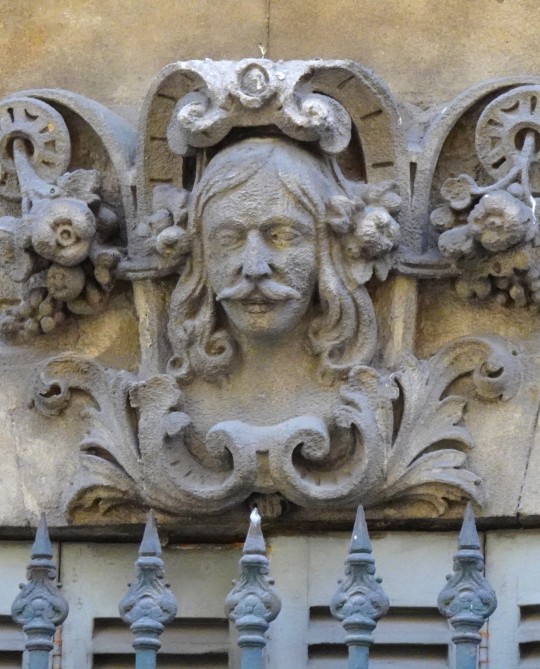
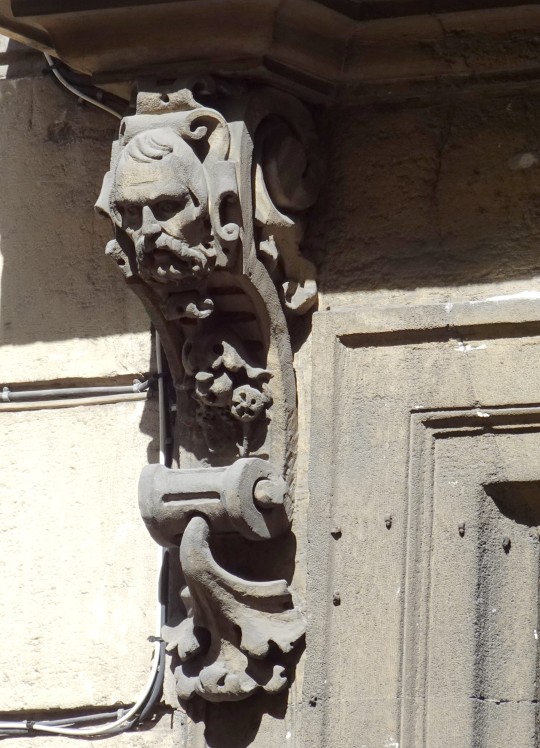
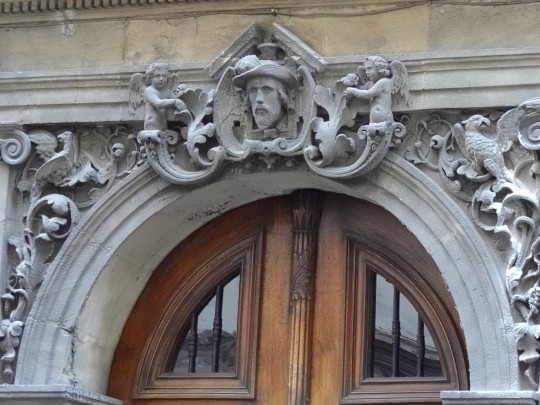

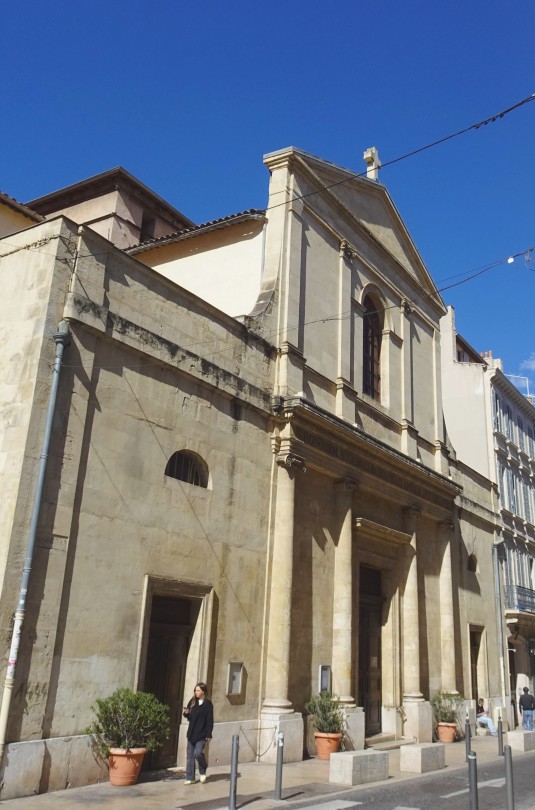
Marseille. Je redescends de Vauban vers le Palais de Justice, par la rue Breteuil.
4 notes
·
View notes
Text

Interior of the church of Breteuil, Picardy region of northern France
French vintage postcard
#vintage#photography#postkarte#interior#french#breteuil#carte postale#postal#region#briefkaart#france#postcard#old#photo#ansichtskarte#sepia#picardy#postkaart#ephemera#church#tarjeta#northern#historic
13 notes
·
View notes
Photo

Chepstow Castle
Chepstow Castle, located in Monmouthshire, South Wales, was first built c. 1067 by William FitzOsbern and then significantly improved c. 1190 CE by Sir William Marshal (c. 1146-1219 CE), one of England's greatest ever knights who served four kings and acted as regent for Henry III of England (r. 1216-1272 CE). Chepstow Castle then became the home of a succession of rich and powerful medieval and Tudor nobles. Despite its innovative design, and the expense of its formidable defensive features - or perhaps because of them, the castle was never attacked in the medieval period. Chepstow is today a fine example of 11-13th-century CE castle architecture and boasts the oldest castle doors in Europe.
Early History
Chepstow Castle was first built from around 1067 CE by Earl William FitzOsbern, an ally of William the Conqueror (r. 1066-1087 CE). As with any medieval castle, the location was an important consideration for the castle's future defence and its strategic value. Accordingly, Chepstow Castle was built at one of the gateways to Wales on a limestone cliff overlooking the River Wye. The dramatic curve here in that river gave the castle its Welsh name - Striguil, meaning 'the bend'. Domesday Book (1086-7 CE) records Chepstow Castle as an asset (one of only two castles to be so categorised) because its owner could outweigh the heavy costs of its upkeep by charging a toll on crossing river traffic.
The Norman castle was one of the first to be built in stone, and it is also unusual for not being located near an urban centre. The solid rock base made the castle impregnable to undermining, and its high walls and towers made any attack by siege engines next to impossible. It is perhaps no surprise then that the castle was never attacked in the Middle Ages but it was largely intended as a fortified base from which to attack southern Wales rather than a point of defensive retreat.
The first version of the main rectangular stone castle keep (donjon) was built c. 1072 CE, one of the earliest to be built in England and Wales. The tower cleverly saved costs by having a thinner wall on the river side, and it had the main entrance on the first floor, a typical defensive feature of the period. Another cost-saving device was to reuse locally-found old Roman bricks and tiles in the lower courses, a reminder that the border region between England and Wales had a long history of conflict. Either side of the tower two enclosed courtyards or baileys (aka wards) were built. After FitzOsbern's son Roger de Breteuil participated in a rebellion against William the Conqueror, the Crown took possession of the castle. Sometime before 1119 CE Henry I of England (r. 1100-1135 CE) then gave Chepstow to a loyal follower, one Walter de Clare. Walter's nephew Gilbert Fitz Gilbert de Clare so impressed King Stephen of England (r. 1135-1154 CE) with his martial qualities that he was made, in 1138 CE, the Earl of Pembroke and the castle became thereafter attached to that title.
Continue reading...
34 notes
·
View notes
Text

Breteuil, France, 2021.
#photography#black and white#black and white photography#nikonz6#nikonphotography#nikonfrance#aperture#nikkor z 14 30#breteuil#france
0 notes
Note
hello! i agree with your post about MA being blamed for her husband's actions broadly, but do you have a source for her being the one who suggested a more reasonable carriage for their attempted escape? not that i doubt you or anything but i would like to know more since i have heard many conflicting things about this detail. thank you :)
Oh I should clarify, Marie Antoinette didn't come up with the idea of smaller carriages for the flight--but there's no reason to think she disagreed with the suggestions when you read the related Fersen correspondence. As it was Louis who decided to reject the proposals (which came from Bouille, Breteuil and Fersen) which may have... may have... resulted in the family not being captured.
(I say may have because this was almost a "Titanic" situation in which everything that could have gone wrong, did go wrong, and it wasn't necessarily anyone or any particular choice's "fault." But people love to blame Marie Antoinette for Varennes, usually claiming she wanted to have a big vain carriage or she refused to part from her perfumes or she was a dumb woman who didn't realize they shouldn't all travel together etc etc.)
The initial proposals (I believe direct from Fersen & Bouille, not sure offhand about Breteuil) was for multiple common carriages--which would require the family to be split up--whereas the king wanted one large carriage that would mean the family (and Tourzel) would be together, and would not need to stop for various necessities.
Sometimes Tourzel is blamed for this, the idea being that the reason for the larger carriage was because she refused to part from Louis Charles, but I haven't found any letters which suggest it was Tourzel who was the deciding factor here. NVM I remembered it was Bouille who blamed her initially; Bouille said in his memoir the reason why the king didn't have a military man in the carriage is because Tourzel refused to not go with the family. But this was not brought up at all in the actual 1791 correspondence, it's something Bouille claimed much later.
And in any case, Louis was the king, he could have easily told Tourzel that she must be in a separate carriage... and would a 5 person carriage really be all that smaller than a 6 person one?
Edit: To add, the Tourzel variation of why the carriage was so big is fascinating because Madame de Tourzel's version of events is that Marie Antoinette said she (Tourzel) would be too ill to make the journey and must leave the Tuileries before the flight.
Tourzel basically told Marie Antoinette that she was willing to die for the family and her charges, and that if she were a man Marie Antoinette would not have said she must stay behind, and that if she left the palace everyone would know about their plans because she had publicly said that "death along could make me abandon the dauphin," and that if she thought for a moment she was hampering the flight, she would of course stay behind/not go with them, but that she would otherwise wish to go and serve her country.
But this gets turned into "Tourzel wept to the king about it and he gave into a woman's tears."
Anyway--
Bouille and Fersen also proposed that the king have able military men with them for safety and to take charge; this was also rejected. Louis initially wanted M. de Bombelles with him but rejected it due to political implications. It was not until very late that this was rejected, a lot of the flight to Montmedy plans had to be rearranged and put off for many reasons. One being that one of the dauphin's attendants was a "strong democrat" who would have jeopardized the plan if she was there,and they were waiting for be away from the palace.
Although the book itself is not one I recommend for reasons anyone who reads my blog will already know, Farr's "I Love You Madly" has a good amount of the Fersen/Bouille/etc letters leading up to the flight which provide a decent look at Louis' choices in regards to rejecting the more, IMO, sensible proposals that were offered to him.
So to clarify my lil rant, it's not so much that Marie Antoinette came up with the smaller and multiple carriages, than it is that she was not the one who rejected it and she had no objections to it that we know about--it was Louis who ultimately rejected the idea.
48 notes
·
View notes
Text

Le “Vestibule" de l'ancien "Hôtel de Breteuil" (XVIIIe siècle) installé dans le parcours des Collections Permanentes du Musée Carnavalet, Le Marais, Paris, novembre 2024.
1 note
·
View note
Text
Randomly sharing this: this picture was taken during a Charles Perrault display organized at the Château d'Ussé (Indre-et-Loire area). It depicts the fairy godmothers of Sleeping Beauty offering their gifts.

It is a custom in some French castles to display special fairytale set-ups inspired by Perrault's stories. When I was a kid my school had us visit one of the most famous one at the time - the Perrault set-up at the Breteuil castle.



18 notes
·
View notes
Text
Laure Junot's account of the dramatic end of the affair between Junot and Caroline
Now this is where things get exciting - we have reached the point in the book 'La Generale Junot' by Joseph Turquan where excerpts are included from Laure Junot's 'journal intime' where she describes the various details of her and Junot's affairs. The incomplete manuscript was given to Turquan by Georges Aubert, Junot's grandson.
However, the manuscript only included pages labelled 45 to 129, and Aubert requested for 'too intimate details' to be removed, and so the 'journal intime' published in Turquan's book is not the full work.
It goes without saying that in this excerpt Laure wishes to portray Caroline Murat as a villainous temptress, so please be aware that Laure's commentary is heavily biased.

“…General Junot had been invited to come and dine at L.L. A.A. I.I. the same day; the note added that the princess was very keen that my condition* allowed me to accept. She knew very well that I didn't go by carriage because of my condition. The general went there and in the evening, at half past eight, he was already home. His expression was agitated. I feared the misfortunes that could happen at any hour of the day. I ventured to speak to him. But he replied in a very open manner that he was going to change into another outfit and end his evening with me. In my living room there were Cardinal Maury, Baron de Breteuil, M. de Narbonne, M. de Valence and some of our female friends. At nine o'clock, in fact, he goes to his house to change clothes and take off his uniform. An hour passes, he doesn't come back. I go to his house, no one! I ring the bell: his trusted valet arrives.
-"Where is the general?" -"Madame, he went out." -"By carriage?" -"No, Madame, on foot." -"It's okay, go." When he was gone, I sank into a chair, completely devastated: it was only too clear to me that it was an appointment. And he had to leave at seven in the morning!**
I returned to the salon and said to excuse him that orders from the Emperor had called him to the chateau. Soon everyone left, with the exception of the Count of Narbonne and Mme de Noailles, my childhood friend. They both knew my position. So I could cry in front of them. They both stayed until one in the morning. I didn't know what mood he would be in and I urged them to leave before his arrival, especially since Mélanie was furious and wanted to shame him, she said, of his behavior.
When I was alone, I gave in to all my despair. I had wanted to exonerate Alexandre*** in the eyes of my friends, but in mine his behaviour was no less painful and offensive. Leaving me at the moment of moving away from me for an indefinite period of time, leaving me at the moment of being a mother, without spending the last moments of his stay near me, and for whom? For a woman who I myself knew was unworthy of him.
Sitting on a couch in the darkest corner of my bedroom, I had just counted three hours on my clock. Then my agitation redoubled and changed object. All that sinister worry has for a beloved object crowded around my mind. The day was about to dawn. It was impossible for the general to be so imprudent as not to warn him. — I imagined that Murat, suspecting that this last night would have been given to love, had surprised them; that Junot had perhaps perished in a tragic way…
The more the hour went on, the more my ideas became confused. My pulse beat with frightening speed and inequality. I heard extraordinary noises. I saw strange shapes wandering around me, in short I was in a complete state of madness, but my heart understood. Oh, how much I suffered, that cruel night of August 27 to 28! What a memory! Today, when a slightly severe pain makes me believe that I am suffering, I put my thoughts back to it and the present pain is no longer anything but illusory.
At four o'clock, it was impossible for me to resist what I was feeling. I crossed the small salon which serves as a communication between the two apartments and I rang the bell for his valet. This man, who had been in his service for many years and who loved him in adoration, was also very attached to me. I knew he had all the confidence of his master. So, without stopping at the reserve that I usually used with servants, I told him of my fears, and they became much more acute when I saw that he shared them. He told me, without me asking, that the general had come to undress, that after rereading a very short note that he had noticed very well, the general had hit his head several times, had loaded his pistols, had put on a coat, then left through the door of the small hotel which overlooks the rue Saint-Honoré. All this taught me nothing and yet these details redoubled my tears and my worries. I dismissed Heldt - and I remained in this room. I looked at this bed and I shuddered to think that its owner was perhaps going to come and die there barely in the spring of his life, for a woman who had never been able to appreciate either his heart or all that it was worth.
I was no longer crying: my eyes no longer had tears. Five o'clock had just struck. Daylight had broken and peeked through the thick curtains that hid the windows. Destroyed by my worry, I was only informed of my existence by a feeling of acute pain which made me suffer so much that I am surprised myself that I was able to resist it. My poor child sometimes called me back to life with his gentle twitches, when I came back completely from the unexpected sight of his father.
He entered through the back door of the hôtel, crossed the stable yard and, taking a small hidden doorway, arrived without noise. When I saw him, I was so happy, my heart was so flooded with happiness, that I could not reproach him. I threw myself around his neck and, wrapping my arms around him, I covered him with kisses and kisses. His eyes, his hair, his clothes, everything about him was the object of a new attention… I held him against me, our mouths met. One of those kisses of fire which always gives the first happiness when we love each other, reminded me of my sad pain. He wanted… Ah! my God, how quickly I rushed away from him! He himself did not try to hold me back.
"Why did you stay up so late?" he asked me with pain; "what imprudence! How pale and changed you are!" Indeed, my face was upset. He told me some rather poorly plotted tale that I just didn't want to listen to. - "But why not take care of yourself?" And he took my hand. I resisted. -"Why?" he said to me gently; "no, don't fear me. I promise you," he added, seeing that I was still hesitating. -"Oh!" I said to him, "your heart finally understands me?" He blushed and, drawing me even closer to him, he put his hand on my breast to feel movement from his child. The poor little one seemed to thank his father's hand. "His poor little heart already seems to hear me," he said with a sad smile. -"Yes," I said to him, "because it is close to mine, and mine has always been yours. He will love you as you love his mother."
He looked at me with eyes full of tears. -"Laure," he said to me, "you deserved a better fate." I laid my head on his chest and there I cried with less bitterness. That last word almost killed me. "Hey! What," I cried, "is my fate unhappy for ever?" "No, no, no," he replied forcefully, "but can the damage that has been done be repaired?" -"The heart repairs everything, my Alexandre; mine is already happy with what you just said." And I was happy, I found this sweet regard, this penetrating smile, I found it whole. -"My friend, how happy I am!" -"Really?" -"Oh! yes." -"Prove to me that you forgive me." -"I really want to".
He drew me to him and again wanted… This time I moved away less abruptly, but no less resolutely. He again felt his wrongdoing, and hit his head hard. He stopped in front of me, stared at me for a long time, then said: -"I don't want to leave!" -"You don't want to leave?" -"No!" -"But the emperor?" -"He won't know." -"What? What are you saying?" -"That I won't leave until tomorrow; that now we are going to leave for Raincy where you must establish after my departure. My men will leave, but I will stay until tomorrow at this time. Listen," he added, "I can't leave without having had an explanation which is important to our future happiness. Yes, our happiness," he continued, seeing my astonished look. "Go rest for a few hours, then we'll leave."
I threw myself on my bed without finding any sleep. But I found there a kind of calm that had been unknown to me for a long time. At noon we got into a closed carriage and, having arrived at Raincy, Alexandre put the horses in a small carriage which had been made in our happy days to wander in the beautiful woods without being followed, and we spoke of everything alone.
Alexandre was deeply moved. His emotion was far from calming down when he spoke to me about what was bothering him. Approaching this subject with noble confidence, he denied none of the sorrows he had given me; he even accused himself of cruelty. He agreed with everything. But he gave me evidence and written proof of the persecution he had endured and to which an angel would have finally succumbed. “Yes, I loved [Caroline Murat],” he said to me; "but my heart never beat for her. She is pretty, she is a princess, sister of my master… All this prestige seduced me. My head turned and I caused your misfortune and perhaps mine. Yesterday, in what state I found you! And for whom was I thus exposing my wife, my child… Because my death, I know, would have led to yours at that moment." -"Your death!" I cried, turning pale with terror… He said nothing, but taking a note from his bosom, he gave it to me to read. I saw, written without spelling, in its usual way, and in the hand of the princess, these remarkable words:
"I cannot bring myself to think that you are going to leave without a final meeting having taken place between us. When you get home, you will have to put up with screaming and whining. Leave all that and come to your Caroline. Come by the ordinary route. Everything will be open. But above all, and don't forget, come armed and well armed. You understand why."
What I felt when reading the last lines of this note, disgusting by its common twist and the entirely material feeling that it seemed to express, what I felt cannot be conveyed. So a woman could, to satisfy carried away senses, expose at the same moment the life of her husband, the father of her children, the life of the lover she claims to love!… The memory of this moment makes me shiver again. Alexandre took my hand. -"I can imagine how much your heart is suffering," he said to me, "but judge what mine must have felt when I read this infernal note." -"However, you went to this meeting." -"Could I dispense with it? This was impossible for me. I owed it to you, my poor Laure. This woman is a Messalina. But don't complain about the meeting: it opened my eyes forever."
I then learned from Alexandre that as soon as she entered her room she herself had examined whether the pistols were in good condition, and her pretty hand had from its holster a superb Turkish kanjar, which Alexandre always carried on his errands nocturnal, and had tried if the tip was sharp enough; then she closed the doors herself and joked about the resistance that could be put up if Murat wanted to enter. Alexandre told me that this behaviour, combined with this note, had produced such an effect on him that his senses, usually so fiery around her, were completely mute. Unaccustomed to such treatment, instead of understanding the cause of such a state, she made it even more humiliating for her charms by the fury in which she abandoned herself.
-"You went back to that woman!" she shouted with rage; "you returned to her! You didn't expect that I would have the courage to see you tonight." “No,” he replied coldly, "because she wouldn’t have wanted it. Besides, let's not mention her name, I've already asked you not to." This was how the first hour of this unfortunate meeting passed. She used all the art of seduction to bring back a love that was casting its last glow. But the blindfold had been untied, the prestige had fled, and Alexandre told me that seeing this woman consume herself in powerless and lazy efforts, and playing the role of a prostitute, the effect she had produced on him was to nullify it. Her rage then knew no bounds. The most violent threats against me especially had escaped her, and he told me that at that moment she had horrified him. -"Oh ! my God," she cried, "it’s finally daylight! I can hope that Murat will see you out and that you will only return home deprived of your life." “Shut up!” Alexandre said to her violently, jumping out of bed; "shut up! Now you inspire nothing but disgust in me; now you horrify me! But listen carefully: if I ever learn that you have interfered in any way with my wife's rest, I will unmask you. In my turn I threaten you and I will keep my word. I will not take revenge in the shadows, but France, the whole of Europe will know your conduct and especially that of this night. Take care of it." She calmed down, she cried, knelt down, asked for and obtained his forgiveness, blamed everything on the violence of her passion and, through her gentle manners, she obtained from Junot a reconciliation which was to be the last sigh of this unhappy affair.
Junot did not hide his concern for me in relation to her. “She hates you,” he said to me; "your wit, your talents, your reputation as a fashionable woman that she cannot usurp despite being a princess, all this embitters and irritates her. Be careful with her, and be on your guard."
We returned to the castle. We were entirely alone. This magnificent home was especially enchanting at this time of year. The park is that of Armide. We left the little rotunda when the moon rose, to sink into its beautiful shade. We were both in a state of sweet languor, of voluptuousness, a thousand times preferable to that passion of the senses which so many people regard as the first merit of love, and which I would like to exclude. When we are truly alarmed, the feeling of the hand of the one we love, their hair touching ours, a simple kiss, — a kiss, the most ravishing charm of love! A kiss given and received by two burning souls is Heaven, it is voluptuousness itself, the last enjoyment of love; we share it with all other beings. But these enjoyments of which I speak, they belong only to humans, it belongs to humans alone to feel them. “We indulged in it with a charm all the greater because our two hearts had suffered so much. I forgave. Alexandre was eager for forgiveness. He looked at me, stopped, held me against him, and placing his hand on my breast, I saw tears moisten his eyes as I felt his son kick. We left the castle at nine o'clock; we only returned at two o'clock in the morning, happy, me to have forgiven and to have found my friend, and he to no longer be guilty or exposed to being so. He left at five o’clock and I stayed at Raincy, until the time of my confinement which was to arrive three months later. Now a new era begins for me."
*At the time, Laure was pregnant with her and Junot's third child.
**Junot was due to leave for Lisbon.
***The name by which Laure called her husband.
#juju Christmas!!!!#jean andoche junot#laure junot#caroline bonaparte#caroline murat#joachim murat#napoleonic era#napoleonic
12 notes
·
View notes